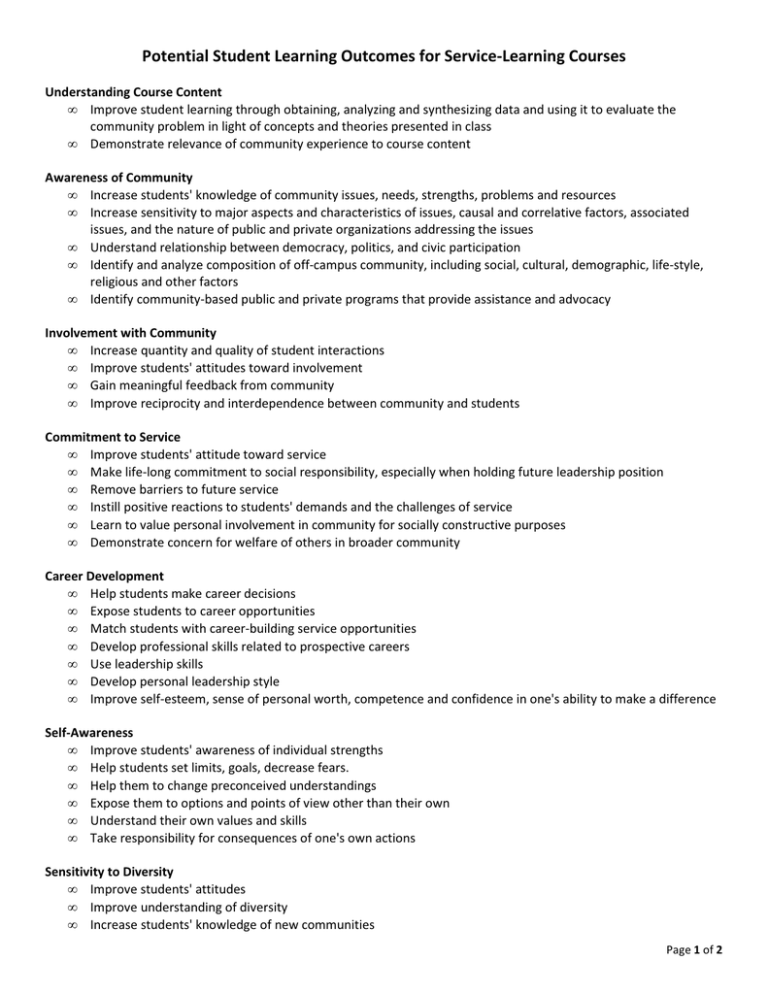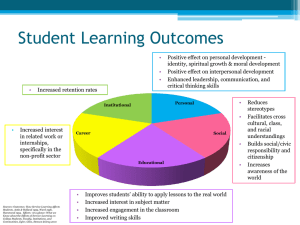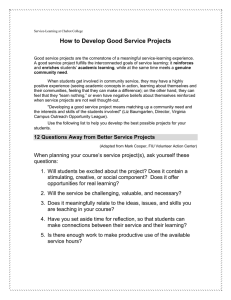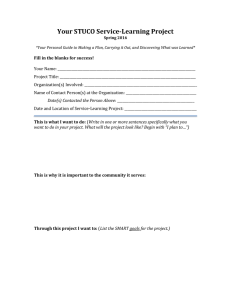Potential Student Learning Outcomes for Service
advertisement

Potential Student Learning Outcomes for Service-Learning Courses Understanding Course Content • Improve student learning through obtaining, analyzing and synthesizing data and using it to evaluate the community problem in light of concepts and theories presented in class • Demonstrate relevance of community experience to course content Awareness of Community • Increase students' knowledge of community issues, needs, strengths, problems and resources • Increase sensitivity to major aspects and characteristics of issues, causal and correlative factors, associated issues, and the nature of public and private organizations addressing the issues • Understand relationship between democracy, politics, and civic participation • Identify and analyze composition of off-campus community, including social, cultural, demographic, life-style, religious and other factors • Identify community-based public and private programs that provide assistance and advocacy Involvement with Community • Increase quantity and quality of student interactions • Improve students' attitudes toward involvement • Gain meaningful feedback from community • Improve reciprocity and interdependence between community and students Commitment to Service • Improve students' attitude toward service • Make life-long commitment to social responsibility, especially when holding future leadership position • Remove barriers to future service • Instill positive reactions to students' demands and the challenges of service • Learn to value personal involvement in community for socially constructive purposes • Demonstrate concern for welfare of others in broader community Career Development • Help students make career decisions • Expose students to career opportunities • Match students with career-building service opportunities • Develop professional skills related to prospective careers • Use leadership skills • Develop personal leadership style • Improve self-esteem, sense of personal worth, competence and confidence in one's ability to make a difference Self-Awareness • Improve students' awareness of individual strengths • Help students set limits, goals, decrease fears. • Help them to change preconceived understandings • Expose them to options and points of view other than their own • Understand their own values and skills • Take responsibility for consequences of one's own actions Sensitivity to Diversity • Improve students' attitudes • Improve understanding of diversity • Increase students' knowledge of new communities Page 1 of 2 • • Respect and appreciate different perspectives within diverse populations Understand cultural traditions and their relationship with American and world societies Sense of Ownership • Help students develop autonomy and independence from faculty • Improve students' comfort with their roles as learners • Have students assume responsibility for community projects • Help students develop a sense of their own role in the community partnership • Enhance appreciation of value of course content • Develop commitment to life-long learning • Explore altruistic and social justice motivations for community participation Communication • Develop students' oral and/or written communication skills • Improve student recognition of importance of communication • Use variety of ways to articulate information (written, verbal, art, media, etc) • Learn to collaborate and negotiate to resolve conflict Critical Thinking • Improve students' ability to think, apply information to problem solving, and analyze information data and concepts • Students formulate plans within contextual constraints • Apply theoretical concepts • Increase complex problem-solving ability Valuing Pedagogy of Multiple Teachers • Help students realize roles of various participants in learning: student peers, community members, faculty and community at-large Improving Life Skills • Demonstrate skills and attitudes needed for learning from experience (observing, interviewing, asking questions, thinking for one's self) • Learn to gather information • Have new experiences: take risks, accept challenges, assume new roles • Demonstrate necessary leadership skills such as those needed to plan, recruit, orient, train, motivate, evaluate, assess needs and create budgets • Formulate or clarify personal values, attitudes, ethics and beliefs • Demonstrate independence, autonomy, assertiveness • Take responsibility for one's own actions • Demonstrate perseverance in the face of difficulty Source: Service-learning workshop materials developed by the Center for Community Service-Learning at CSU-Northridge. http://academic.csupomona.edu/ccsl/course/learningoutcomes.htm Page 2 of 2


